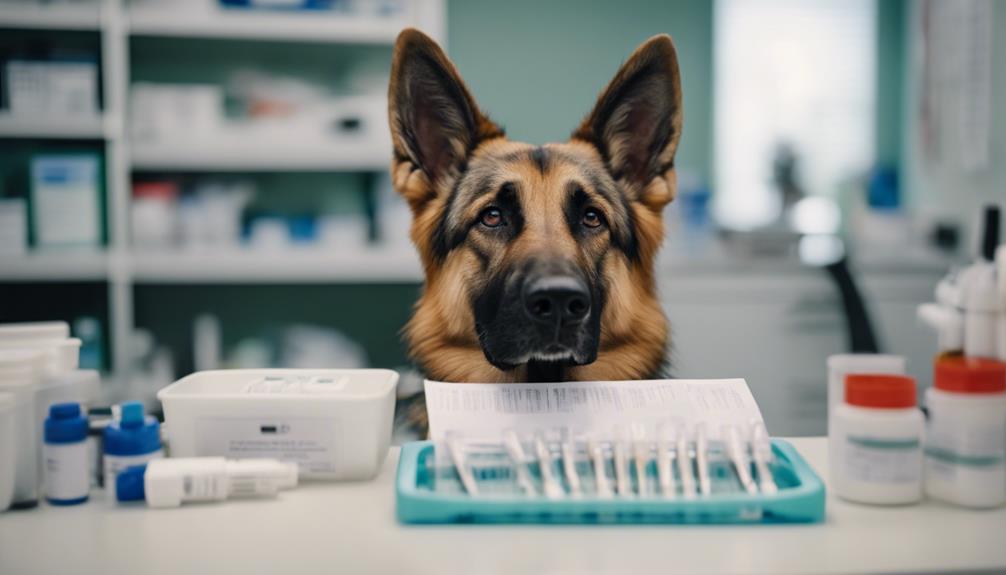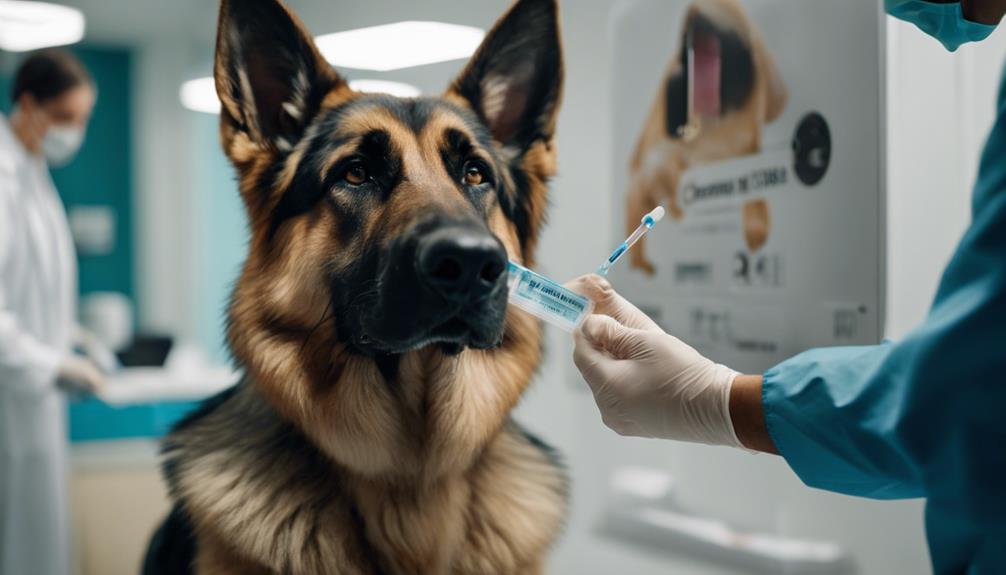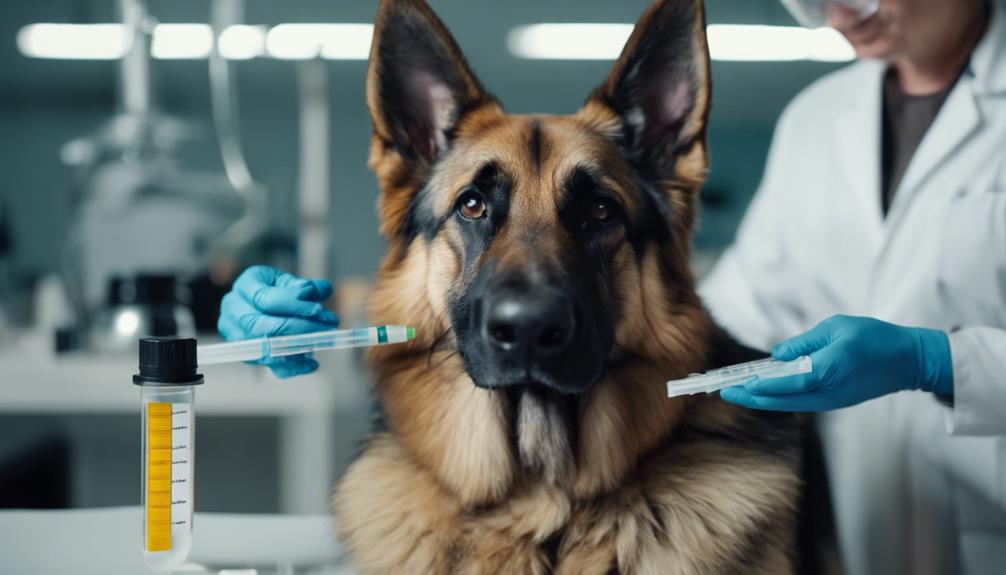🐾 Paw-some Partnership Alert! 🐾
As a pack of German Shepherd enthusiasts at MixGermanShepherd.com, we're always sniffing out the best products for our furry friends. Guess what? When you fetch something from Amazon through our links, we earn a little treat! 🦴
If you've ever wondered about the genetic makeup of your German Shepherd mix, genetic testing holds the key to unlocking vital information about their health and traits. By unraveling the mysteries hidden within their DNA, you can gain a deeper understanding of what makes your furry companion unique. But what exactly can genetic testing unveil about your German Shepherd mix's heritage and potential risks? Explore the possibilities that genetic testing offers for these beloved hybrid dogs and how it can impact their well-being and care.
Key Takeaways
- Identifies potential health risks and specific genetic makeup
- Guides proactive health management and tailored care plans
- Essential for responsible breeding practices and overall well-being
- Reveals insights into behavioral traits and personalized healthcare plans
Importance of Genetic Testing for German Shepherd Mixes

Genetic testing for German Shepherd mixes is crucial in identifying potential health risks inherited from different breeds in the mix. DNA testing can reveal the genetic makeup of these mixes, shedding light on specific health issues that may arise. By understanding the breed-specific traits present in German Shepherd mixes, such as predispositions to certain diseases or conditions, proactive health management plans can be developed. This knowledge is invaluable for both current dog owners and breeders alike. Health testing through genetic analysis allows for tailored healthcare plans to be implemented, ensuring the well-being of these unique mixed-breed dogs. For breeders, genetic testing provides essential insights that can guide responsible breeding practices and help in making informed decisions. Ultimately, genetic testing plays a vital role in safeguarding the health and longevity of German Shepherd mixes, offering a proactive approach to addressing potential health risks inherited from their diverse genetic backgrounds.
Common Genetic Health Risks in German Shepherd Mixes

German Shepherd mixes are prone to genetic health risks like Degenerative Myelopathy and Scott Syndrome. These mixes may also carry less common factors such as MDR1 Drug Sensitivity and Platelet Factor X Receptor Deficiency. Identifying these risks through genetic testing is crucial for proactive management and informed decision-making.
Health Risks Overview
In German Shepherd mixes, it is crucial to be aware of common genetic health risks, such as degenerative myelopathy (DM) and MDR1 drug sensitivity. These breeds have a 66.99% clear rate for DM and a 98.6% clear rate for MDR1 sensitivity. Genetic testing plays a vital role in understanding and managing these health risks. By identifying carriers through genetic testing, responsible breeding practices can be enforced, reducing the prevalence of inherited disorders in future generations. Being proactive in genetic testing for German Shepherd mixes enables informed health decisions and contributes to the overall well-being of these dogs. Stay informed about these health risks to ensure the best care for your German Shepherd mix.
Preventive Care Tips
How can you proactively safeguard the health of your German Shepherd mix against common genetic health risks? Genetic testing is crucial in identifying potential issues like Degenerative Myelopathy, Platelet Factor X Receptor Deficiency, and MDR1 Drug Sensitivity early on. By understanding your dog's genetic makeup, you can tailor preventive care measures to their specific needs. Regular veterinary check-ups are essential to monitor any signs of these conditions. Additionally, be cautious with medications due to MDR1 Drug Sensitivity – genetic testing can inform you of safe drug choices. Providing appropriate exercise and a balanced diet will help manage these health risks. Stay informed and proactive to ensure your German Shepherd mix leads a healthy and happy life.
Rare Genetic Health Risks in German Shepherd Mixes

You need to be aware of the potential hidden health issues that can affect German Shepherd mixes, including rare genetic disorders like Canine Leukocyte Adhesion Deficiency Type III and Hemophilia A. These mixed breed concerns stem from the broader genetic pool of German Shepherds and can pose significant risks to your dog's well-being. Ensuring safety through genetic testing is crucial in identifying and managing these rare health risks for the overall health and quality of life of your German Shepherd mix.
Hidden Health Issues
Hidden within the genetic makeup of German Shepherd mixes are rare health risks that demand attention through proactive genetic testing. DNA testing for German Shepherd mixes can reveal potential genetic health risks such as Scott Syndrome, MDR1 Drug Sensitivity, and Achromatopsia, which may affect a small percentage of these dogs. By understanding and identifying these hidden health issues early on, owners and breeders can make informed decisions regarding the care and breeding of German Shepherd mixes. Proactive management through genetic testing allows for early detection and appropriate treatment if necessary, ultimately contributing to the overall well-being and quality of life of these mixed-breed dogs. Stay vigilant and prioritize genetic testing to safeguard the health of your German Shepherd mix.
Mixed Breed Concerns
Rare genetic health risks present in German Shepherd mixes encompass disorders such as Canine Leukocyte Adhesion Deficiency (CLAD) and Hemophilia A/Factor VIII Deficiency (HEMA). Understanding these potential risks can aid in preventive healthcare measures for your furry companion. The table below outlines some of the rare genetic health risks that German Shepherd mixes might face:
| Disorder | Description | Testing Available? |
|---|---|---|
| Canine Leukocyte Adhesion Deficiency (CLAD) | Impacts the immune system, leading to recurrent infections and reduced white blood cell function. | Yes |
| Hemophilia A/Factor VIII Deficiency (HEMA) | Affects blood clotting, causing prolonged bleeding after injuries or surgeries. | Yes |
Being aware of these rare genetic health risks and utilizing DNA testing can assist in proactively managing your German Shepherd mix's health.
Safety in Testing
Safety measures must be carefully implemented when conducting genetic testing for rare health risks in German Shepherd mixes. These tests are crucial for identifying conditions like MDR1 drug sensitivity, which can have a significant impact on the health of German Shepherd mixes. By understanding and addressing these rare genetic health risks, breeders can make informed decisions to improve the overall well-being of these mixed breeds. Testing for specific risk factors allows for proactive measures to be taken in preventing potential health issues in future generations of German Shepherd mixes. Prioritizing genetic testing for these rare conditions contributes to the responsible breeding practices that aim to produce healthier puppies and reduce the prevalence of genetic health risks within the German Shepherd mix population.
Methods of Genetic Testing for German Shepherd Mixes

Genetic testing methods for German Shepherd mixes offer a reliable way to determine their breed composition beyond solely relying on physical characteristics. DNA testing plays a crucial role in unveiling the percentage of German Shepherd heritage present in mixed-breed dogs. By analyzing DNA, these tests can also reveal potential health risks and behavioral traits associated with the specific mix. Utilizing testing methods such as breed identification panels enables the identification of German Shepherd genes within mixed-breed dogs accurately.
Understanding the breed composition of German Shepherd mixes through genetic testing is vital for tailoring appropriate care and training strategies. By gaining insights into their genetic makeup, owners can better prepare for any potential health issues that may arise due to specific breed predispositions. Additionally, knowing the breed composition can aid in predicting certain behavioral tendencies, allowing for targeted training approaches to address any potential challenges effectively. Genetic testing serves as a valuable tool in providing comprehensive care for German Shepherd mixes.
Benefits of Genetic Testing for German Shepherd Mixes

Exploring the genetic makeup of German Shepherd mixes through testing reveals invaluable insights into their health risks and behavioral traits. Genetic testing for German Shepherd mixes serves as a powerful tool in uncovering potential health risks inherited from the various breeds in their lineage. By delving into the specific genetic composition of your German Shepherd mix, you gain a deeper understanding of their unique characteristics and behaviors. This knowledge empowers you to tailor their care, training, and exercise regimen to suit their individual needs accurately.
Moreover, genetic testing can uncover any predispositions to certain diseases or conditions that may be more prevalent in specific breeds present in the mix. Armed with this information, you can take proactive measures to manage your dog's health effectively. Understanding the genetic background of your German Shepherd mix not only enhances your bond but also enables you to provide the best possible care for their well-being.
Understanding Genetic Test Results for German Shepherd Mixes

Upon receiving the genetic test results for your German Shepherd mix, you can gain valuable insights into their breed composition and potential health risks.
- Breed Composition: The DNA testing reveals the different breeds present in your mix, helping you understand their unique traits and characteristics.
- Health Risks Identification: Genetic test results highlight potential health risks that are more common in specific breeds within your mix, enabling proactive healthcare planning.
- Tailored Healthcare Plans: Understanding the genetic makeup of your German Shepherd mix allows for personalized healthcare and nutrition plans to address their specific needs.
- Predictive Health Insights: By delving into the genetic test results, you can anticipate potential health issues based on the inherited traits, aiding in preventive care measures.
Frequently Asked Questions
What Genetic Testing Should Be Done on German Shepherds?
When considering genetic testing for German Shepherds, it's essential to screen for common health risks like Degenerative Myelopathy and Platelet Factor X Receptor Deficiency. Identifying these issues can guide breeding recommendations, promote better health outcomes, and enhance breed preservation.
How Accurate Are Mixed Breed Dog DNA Tests?
DNA test reliability varies among mixed breed dog tests, influenced by testing company and breed complexity. Accurate breed identification aids understanding of genetic diversity and dispels mixed breed misconceptions. Such tests offer insights for tailored care.
How Do I Know What My German Shepherd Is Mixed With?
To discern the breed mix of your German Shepherd, observe behavior traits, coat colors, health risks, and size variations. Seek guidance from professionals, explore rescue organizations, and research common mixed breeds. Genetic testing like Embark can provide detailed insights.
How Do You Test for Hip Dysplasia in German Shepherds?
You can test for hip dysplasia in German Shepherds through orthopedic evaluations such as the OFA hip evaluation. This involves radiographic imaging to assess the hip joint's quality and detect dysplasia, a common genetic health issue in the breed.
Conclusion
In conclusion, genetic testing for German Shepherd mixes is essential for identifying potential health risks and inherited traits that may impact the well-being of these hybrid dogs. By utilizing advanced testing methods, breeders and owners can make informed decisions to ensure the health and longevity of their pets. Remember, knowledge is power, and by staying informed through genetic testing, you can provide the best care for your German Shepherd mix, setting them up for a healthy and happy life.
